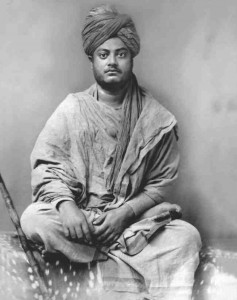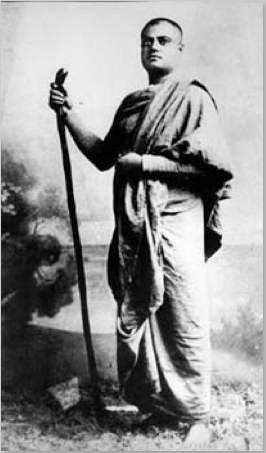The improbable journey of a brilliant but headstrong child called Naren in becoming a monk called Swami Vivekananda has been covered earlier. The Swami is now on a ship headed west to attend the Parliament of Religions. This is an epic and unprecedented journey for it is the first time a realized master of the caliber of Swami Vivekananda is headed west.
When he arrived in Chicago Swami Vivekananda learnt that he needed a letter of introduction to register, and that the date for registration had already passed. There was no chance that he would be allowed to speak in the “Parliament of Religions”. After a few days in Chicago he realized that he was running out of money. The opening date of the “Parliament of Religions” was put off by a few months. Somebody told him that Boston was cheaper and he could make his money last longer. So he boarded a train for Boston. On the train he met Miss Kate Sanborn, who invited him to be a guest at her home. She introduced him to Prof J. H. Wright of Harvard University. Swami Vivekananda had many in-depth discussions with Prof. Wright and the professor was duly impressed. When he learnt of the swami’s difficulty in attending the “Parliament of Religions” he told him that, “To ask you for your credentials is like asking sun about its right to shine!” The chairman of the committee that selected the delegates was his friend and he wrote him a letter that said, “Here is a man who is more learned than all our learned professors put together.” Based on this the swami was accepted as a delegate. Knowing that the Swami was running short of cash Prof. Wright even bought him the tickets to Chicago.
The day came when the “Parliament Of Religions” opened. There were thousands of people in the audience. Swami Vivekananda found himself on the stage with 23 other delegates. One by one each delegate was introduced and spoke briefly. At last it was his turn. He had no prepared speech and he had no idea what he was going to say. He had never addressed an audience of this size before. When the time came to speak the first words that came out from his mouth were, “Sisters and Brothers of America.” On hearing this the audience spontaneously broke out in an applause. Here was a delegate who instead of addressing them formally was addressing them from the heart. This touched a chord and the audience responded immediately with a warm ovation. The warmth of the audience helped settle down the swami who went on to give a great speech. After the speech was over the applause was deafening! The audience fell in love with the swami who suddenly found himself the new star of the show. Swami Vivekananda refused to be pigeon holed as a representative of Hinduism but considered himself as a representative of all Religions. He spoke for religious tolerance and religious unity. The audience was waiting for somebody to speak at that level and responded enthusiastically.
Here are excerpts from his short speech: Continue reading



